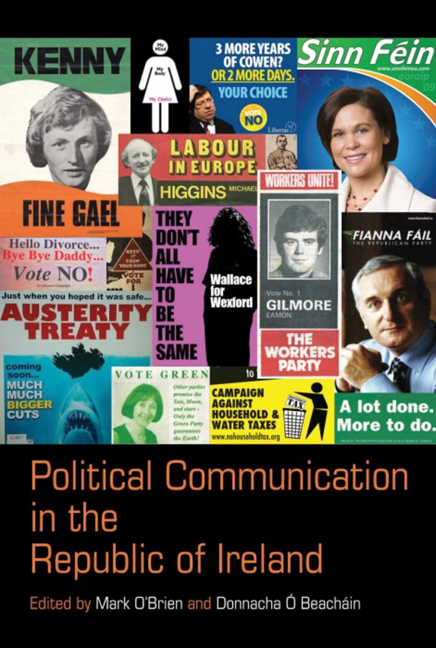Book contents
- Frontmatter
- Contents
- List of Illustrations
- Glossary
- Notes on Contributors
- Acknowledgements
- Introduction
- Part One Political Communication and Politicians
- Part Two Political Communication and Journalism
- Part Three Political Communication and the Public
- 9 A private affair? Lobbying and transparency in modern Ireland
- 10 Equal time for Judas Iscariot? Broadcast treatment of political contests in the Republic of Ireland
- 11 ‘There now follows …’: The role of the party political broadcast and the 2007 ‘peace broadcast’
- 12 Social media and political communication
- 13 Mediating elections in Ireland: evidence from the 2011 general election
- Conclusion
- Index
9 - A private affair? Lobbying and transparency in modern Ireland
from Part Three - Political Communication and the Public
- Frontmatter
- Contents
- List of Illustrations
- Glossary
- Notes on Contributors
- Acknowledgements
- Introduction
- Part One Political Communication and Politicians
- Part Two Political Communication and Journalism
- Part Three Political Communication and the Public
- 9 A private affair? Lobbying and transparency in modern Ireland
- 10 Equal time for Judas Iscariot? Broadcast treatment of political contests in the Republic of Ireland
- 11 ‘There now follows …’: The role of the party political broadcast and the 2007 ‘peace broadcast’
- 12 Social media and political communication
- 13 Mediating elections in Ireland: evidence from the 2011 general election
- Conclusion
- Index
Summary
Across the modern democratic world, lobbying governments and policymakers is considered integral to the process of policy formulation. The work carried out by interest groups is a central and legitimate part of the policy process within all liberal democratic systems. Although the term lobbying has often had negative connotations, the work of lobbyists is essential when policy is being formulated. Lobbyists are an accepted element within society, providing the necessary input and feedback into the political system, thereby helping to develop the policy outputs that drive political, social, cultural, and economic aspects of people's daily lives. Ireland is no different in this regard than any other democratic society.
Lobbying in Ireland and the questions of private influence, access, and expectation have been prominent in public policy debates given the catastrophic collapse of the Irish economy since late 2008 and the role played by lobbyists in contemporary Irish politics. The dramatic fall of the so-called Celtic Tiger and the ensuing misery faced by the Irish people has brought the shadowy world of lobbying to the fore of Irish public consciousness. As unemployment and emigration dramatically increased and negative equity and house repossessions became common it quickly emerged that Ireland's economic miracle of the 2000s was built on rather shaky foundations. But these were foundations that had been built under the urgings of lobbyists. In September 2008 the government decided to bail out the private banks, placing an enormous debt burden on the population, as well as ultimately bringing the IMF to Ireland's shore. Lobbyists were again a crucial part of this decision, one that has had enormous consequences for every citizen of the Irish state. In that context this chapter explores the relationship between lobbying and private interests in Ireland and assesses whether lobbying as a form of political communication has resulted in a politics dominated by a small elite that has access to the avenues and levers of power within the Irish body politic.
Definition and process
There has long been a vigorous academic debate as to the exact meaning and definition of a lobbyist. Classifying lobbying or interest groups, and explaining what exactly lobbying is, have proved immensely difficult.
- Type
- Chapter
- Information
- Political Communication in the Republic of Ireland , pp. 149 - 166Publisher: Liverpool University PressPrint publication year: 2014



